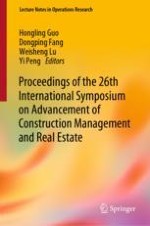2022 | OriginalPaper | Chapter
Reducing Construction Waste Through Modular Construction
Authors : Yang Zhang, Wei Pan
Published in: Proceedings of the 26th International Symposium on Advancement of Construction Management and Real Estate
Publisher: Springer Nature Singapore
Activate our intelligent search to find suitable subject content or patents.
Select sections of text to find matching patents with Artificial Intelligence. powered by
Select sections of text to find additional relevant content using AI-assisted search. powered by
